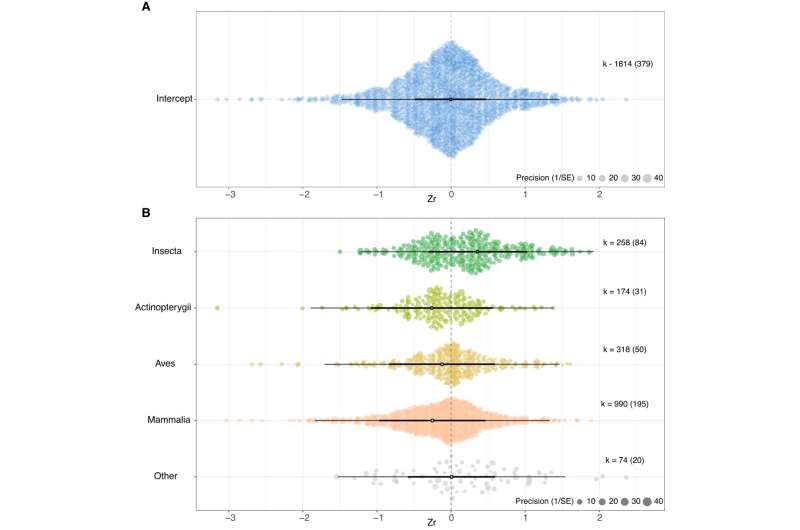This article has been reviewed according to Science X's editorial process and policies. Editors have highlighted the following attributes while ensuring the content's credibility:
fact-checked
peer-reviewed publication
trusted source
proofread
Surprise discovery: For most animals, sperm quality does not reduce with age

In humans, male fertility and sperm fitness decline with age, but scientists have made the surprising discovery that this pattern is not consistent in other animals. The findings have been published in the journal Nature Communications.
The team, led by the University of Oxford, assessed the results of 379 studies which covered a wide range of animals, including mammals, insects, birds, and fish. This found that advancing age seemed to have no impact on ejaculate size, number of sperm, sperm motility, or sperm viability.
For some animals, age even had a positive effect on reproductive traits. In many insect species, for example, ejaculate size, quantity of sperm, and sperm viability all improve with age. However, it is possible that this result may be explained by methodological limitations in the studies. For instance, in many insect studies, males were kept as virgins until old age, during which they are likely to accumulate sperm.
Only lab rodents showed age-related deterioration from all animals examined in most ejaculate traits measured. Dr. Regina Vega-Trejo (Department of Biology, University of Oxford), the co-lead author of the study, said, "The lack of consistency across animals in the impact of aging on ejaculate traits suggests the jury is still out on whether the age-related deterioration in ejaculates happens universally in animals or not."
According to the researchers, the sharp contrast in ejaculate aging patterns between most animals and humans might be because humans now live much longer than they did just a few centuries ago. This may have led to men now living beyond the age at which they evolved to maintain sperm function.
Co-lead author Krish Sanghvi (Department of Biology, University of Oxford) said, "The surprising differences between animals and humans could reflect stronger selection pressures for animals to maintain sperm function across all ages."
The researchers also investigated whether age impacted reproductive outcomes (such as fertilization success and fecundity) in the males of these species. Similar to ejaculate traits, they found that, overall, reproductive outcomes did not improve or decline with advancing age, which is again in stark contrast to what is seen in humans.
According to the authors, the results may be partly explained by methodological limitations, such as studies rarely testing animals that are at an advanced age for their species. They also suggest that male fertility deterioration might not occur for each ejaculate trait in every species.
Senior author Dr. Irem Sepil (Department of Biology, University of Oxford) said, "Reproductive deterioration is of interest to a broad range of disciplines, from evolutionary ecology and demography to humanities and medicine. Our study challenges a key belief in these fields that male reproductive deterioration is universal and documents where we may expect this to occur and why."
More information: Krish Sanghvi et al, Meta-analysis shows no consistent evidence for senescence in ejaculate traits across animals, Nature Communications (2024). DOI: 10.1038/s41467-024-44768-4
Journal information: Nature Communications
Provided by University of Oxford




















